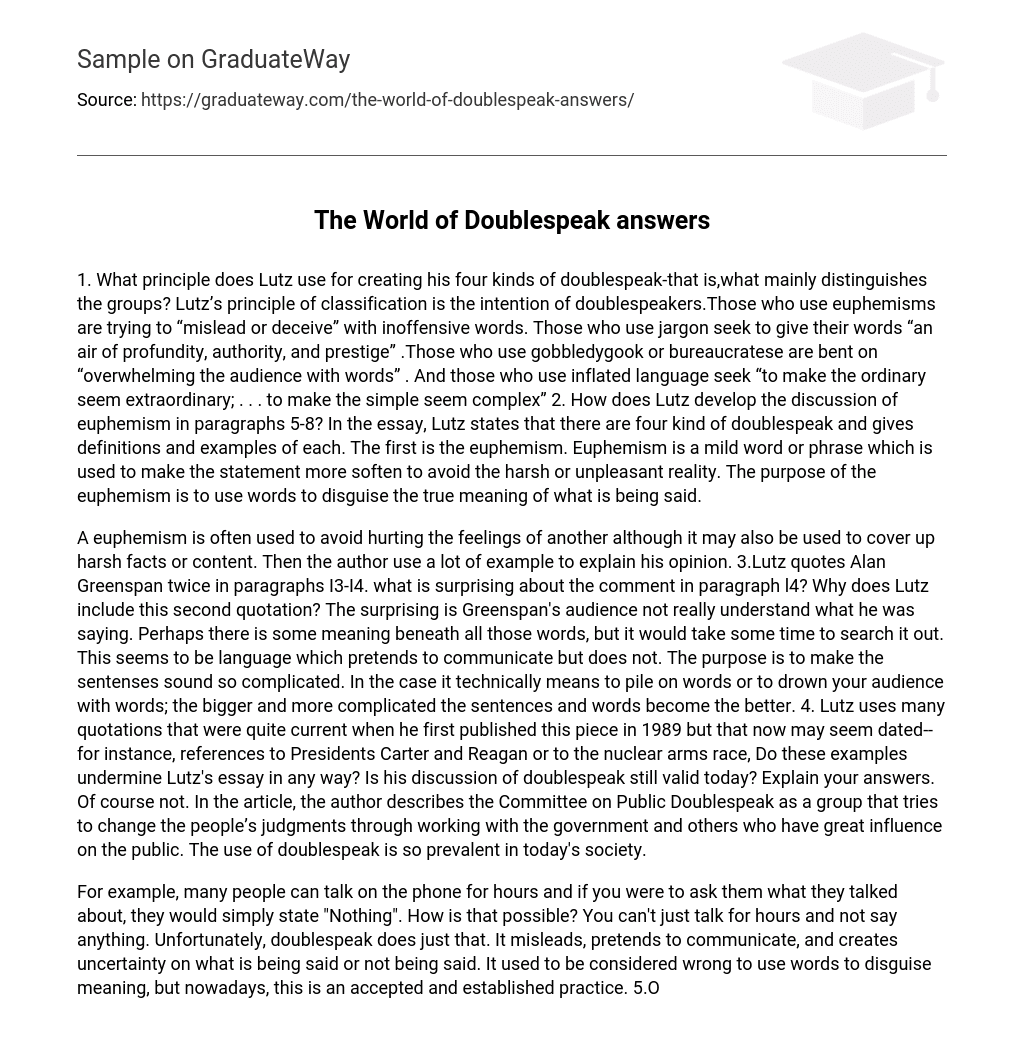1. What principle does Lutz use for creating his four kinds of doublespeak-that is,what mainly distinguishes the groups? Lutz’s principle of classification is the intention of doublespeakers.Those who use euphemisms are trying to “mislead or deceive” with inoffensive words. Those who use jargon seek to give their words “an air of profundity, authority, and prestige” .Those who use gobbledygook or bureaucratese are bent on “overwhelming the audience with words” . And those who use inflated language seek “to make the ordinary seem extraordinary; . . . to make the simple seem complex” 2. How does Lutz develop the discussion of euphemism in paragraphs 5-8? In the essay, Lutz states that there are four kind of doublespeak and gives definitions and examples of each. The first is the euphemism. Euphemism is a mild word or phrase which is used to make the statement more soften to avoid the harsh or unpleasant reality. The purpose of the euphemism is to use words to disguise the true meaning of what is being said.
A euphemism is often used to avoid hurting the feelings of another although it may also be used to cover up harsh facts or content. Then the author use a lot of example to explain his opinion. 3.Lutz quotes Alan Greenspan twice in paragraphs I3-I4. what is surprising about the comment in paragraph l4? Why does Lutz include this second quotation? The surprising is Greenspan’s audience not really understand what he was saying. Perhaps there is some meaning beneath all those words, but it would take some time to search it out. This seems to be language which pretends to communicate but does not. The purpose is to make the sentenses sound so complicated. In the case it technically means to pile on words or to drown your audience with words; the bigger and more complicated the sentences and words become the better. 4. Lutz uses many quotations that were quite current when he first published this piece in 1989 but that now may seem dated–for instance, references to Presidents Carter and Reagan or to the nuclear arms race, Do these examples undermine Lutz’s essay in any way? Is his discussion of doublespeak still valid today? Explain your answers. Of course not. In the article, the author describes the Committee on Public Doublespeak as a group that tries to change the people’s judgments through working with the government and others who have great influence on the public. The use of doublespeak is so prevalent in today’s society.
For example, many people can talk on the phone for hours and if you were to ask them what they talked about, they would simply state “Nothing”. How is that possible? You can’t just talk for hours and not say anything. Unfortunately, doublespeak does just that. It misleads, pretends to communicate, and creates uncertainty on what is being said or not being said. It used to be considered wrong to use words to disguise meaning, but nowadays, this is an accepted and established practice. 5.OTHER METHODS. Lutz’s essay is not only a classification but also a DEFINITION of doublespeak and an examination of cause AND EFFECT. where are these other methods used most prominently? What do they contribute to the essay? Doublespeak is a language that manipulates the way others think and makes them think a certain way so that their personal thoughts are limited. Lutz points out the different types of doublespeak: euphemism, jargon, gobbledygook, and inflated language.
Euphemisms can be used when one is sensitive to someone’s feelings and doesn’t wish to cause unrest, or it can be used to mislead and cover over an embarrassment or unpleasant situation. Jargon is the specialized language of a trade, profession, or similar group, and while this specific style of doublespeak may be used unintentionally, it can also be used to omit certain people from a conversation. This can be done to belittle or mislead and confuse and outside party. Gobbledygook is simply a matter of stringing along big and unnecessary words to impress and overwhelm an audience; however, this style of deceptive language may also be used unintentionally, nervous rambling being such an example.





